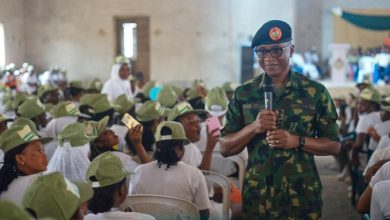Okpebholo suspends market unions, associations in Edo over ‘food stuff price fixing’
Okpebholo said the decision was informed by the disturbing activities of market unions and associations.

Monday Okpebholo, governor of Edo, has suspended all market unions and associations in the state.
Fred Itua, spokesperson to the governor, said in a statement on Wednesday that the suspension is with immediate effect.
Itua said the governor also ordered the police and other security agencies to arrest defaulting leaders of the various suspended unions and associations.
He said the directive was conveyed in a communication notice issued by Umar Ikhilor, the secretary to state the government (SSG).
Okpebholo said the decision was informed by the disturbing activities of market unions and associations.
He said reports abound that the executives of the unions and associations either out rightly prevent farmers from disposing off their wares directly to consumers at the markets or arbitrarily fix prices of staple food at the detriment of the low-income earners in the state.
“The attention of the state government has been drawn to the disturbing activities of market unions in the state,” the statement reads.
“Reports abound that the executives of these unions either out rightly prevent farmers from disposing off their wares directly to consumers at the markets or arbitrarily fix prices of these staple food at the detriment of the low-income earners and generally, the citizens of the state.
“Their actions have ultimately led to an astronomical rise in the prices of staple food in the state, thereby making life unbearable for the common Edo man.
“Edo state government views this action with serious concern and considers it extortionist in nature which should not be allowed to thrive.
“While Edo state government appreciates the role of market traders and their contribution to the economy of our dear state, it will not however serve as justification to allow a few individuals under the guise of market unions executives and for their selfish reasons, continue to hold the entire state to ransom through their selfish and extortionist activities.
“Following from the foregoing, the Governor of Edo State, His Excellency, Senator Monday Okpebholo has approved the suspension of the activities of all market unions in Edo State with immediate effect.
“Security agents have been put on alert, and any person or group who decides to flout this directive would be held accountable.”





